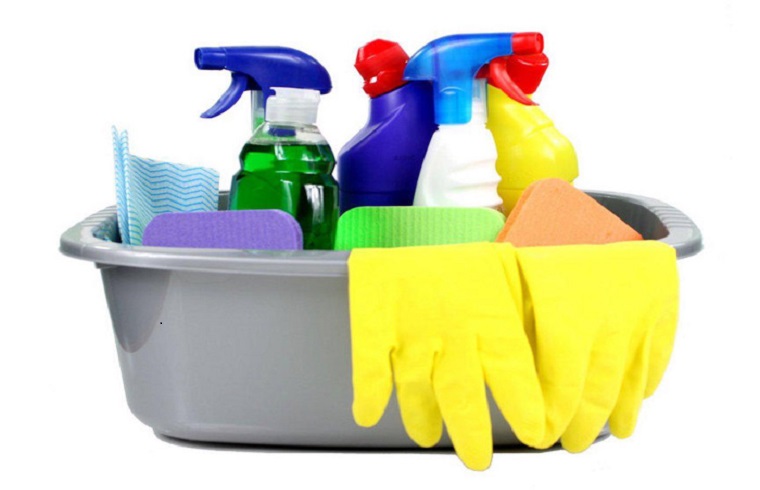Identifying hazardous chemicals in the home

Chemical detergents used at home are often toxic and carcinogenic, and in some cases, when combined with each other, they can be life-threatening.
The toxins in these products have been linked to health problems ranging from asthma to cancer, reproductive disorders, hormonal disruptions, and neurotoxicity.
You should be careful to wear gloves to protect your skin when working with these materials. Also, wear safety glasses to protect your eyes.
Hazardous materials include toxic, corrosive, and flammable materials.
Corrosive substances damage fabrics, metals, and other things. Bathroom and stove cleaners, paint strippers, and car battery acid are all corrosive.
Flammable materials are materials that burn easily, such as gasoline, lighter fluid, and some pressurized liquids in metal cans.
Toxic substances include pesticides, some medications, engine antifreeze, and industrial alcohol.
Hazardous Chemicals in the Home
Air Fresheners
Although these sprays feel pleasant to inhale, the first spray releases large amounts of xylene, formaldehyde, and other aromatic compounds into the air. All of these substances can irritate the skin and eyes upon contact, can cause lung cancer if inhaled for long periods of time, and can have damaging effects on the olfactory system.They damage the sense of smell by creating an oily coating on the nasal passages or nerve receptors. Formalin is the main ingredient in the production of fragrances, and the high volatility of this chemical causes damage to the sense of smell in the long term. Also, due to the presence of petroleum components in these products, there is a possibility of ignition due to heating and contact with flame.
Chlorine gas
Detergents are used for various purposes depending on their cleaning power. These substances contain toxic compounds and gases that can cause serious damage to the skin, eyes, and respiratory tract. These detergents contain ammonia, chlorine, and their derivatives.
Ammonia is a dangerous and toxic chemical. If a compound contains more than 5% ammonia, it is considered a dangerous and toxic substance, causing irritation of the respiratory tract and lungs, as well as skin sensitivity, depending on the concentration of ammonia.
Bleach, on the other hand, contains chlorine gas and sodium hydroxide (caustic soda). In addition to the strong acidic properties of bleach, its use releases chlorine gas, which can cause respiratory problems if inhaled.
If bleach is mixed with detergents containing ammonia, chlorine gas will be released, which is toxic and can even cause death.
Antifreeze
Antifreeze mainly contains ethylene glycol. This substance has a sweet smell and taste, but swallowing antifreeze can cause severe damage to the kidneys, heart, and brain nerves. Antifreeze should be stored in closed containers and out of the reach of children to prevent swallowing by children.
Pipe openers
Pipe openers are products used to clean and flush pipes of deposits and unclog hard-to-reach areas. These products contain sodium hydroxide, sulfuric acid, and hydrochloric acid, which can burn the skin and eyes, cause damage to the kidneys, liver, and digestive tract, and can cause serious damage to the esophagus and stomach if swallowed.
Detergent Powders
Detergent powders, including both machine and hand-held types, contain sulfates such as ammonium sulfate and sodium lauryl sulfate, both of which can aggravate allergy symptoms.
These products often also use chlorine, and if these powders are made available to children, the pigments in them can attract their attention and cause very destructive problems to their digestive systems if they swallow them.
Also, using essential oils to create a pleasant scent in detergent powders can cause respiratory problems for people with asthma.
Windshield Washers
Windshield washers mainly contain methanol and isopropyl alcohol. Methanol is toxic and is absorbed through the skin. Accidental ingestion can cause blindness, kidney damage, and brain damage. Isopropyl alcohol can also cause unconsciousness, coma, and death.
Chemicals that should never be mixed
Jewel water with alcohol:
Produces chloroform and hydrochloric acid, which can cause damage to the nervous system, lungs, kidneys, liver, eyes, and skin.
Bleach with Ammonia:
Combining these two substances produces toxic gases that can cause severe damage to the respiratory system, and combining large amounts of the two together can cause a dangerous explosion.
Bleach with various cleaning agents:
Produces toxic gases such as chlorine, even minimal exposure to which can cause severe respiratory and vision problems.
Baking soda and vinegar:
The most dangerous thing is to mix the two in a closed container, which can cause an explosion.
Vinegar with hydrogen peroxide:
Produces peracetic acid and can cause damage to the skin, eyes, throat, nose, and lungs.
Insecticide with water:
We have all used natural and commercial insecticides to kill them. You may even think that commercial insecticides are stronger than others. You probably think that washing these materials after killing insects will protect your family from their harmful substances. But mixing some of these insecticides with water produces phosphine gas.
Descaler with Descaler:
Some cleaners are acidic and some are alkaline. When one doesn’t clean well, you may be tempted to use another descaler, but no, you shouldn’t. The first descaler is still in the tube and is still active, so adding a second descaler can cause a chemical reaction.










